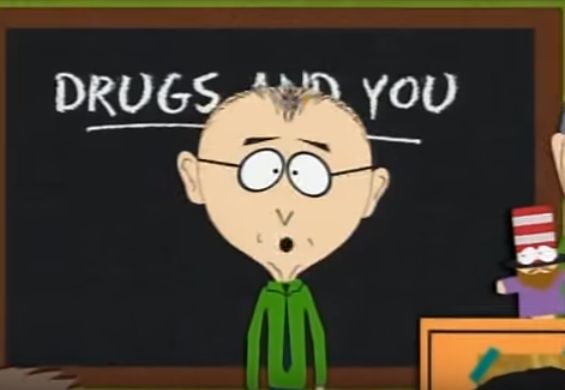Drugs Are Bad, M’kay?

October 29, 2018
Marijuana, cocaine, heroin, ecstasy. These are all addictive substances that, no doubt, you’ve heard the name of more than once. If you’ve heard about them, then you’ve more than likely heard the negative effects they cause as well. You know they’ll damage your brain, make you lazy, and unable to contribute to society. But all the negatives that are constantly harped on don’t always drive everyone away. These anti-drug campaigns and slogans have done little to actually stop drug abuse, if not promote the existence drugs to young audiences. To know why we have made such little progress, you’ve got to know the history behind “The War on Drugs”.
“The War on Drugs” has been smashed into the minds of Americans since the early 1970’s, when Nixon made his opinions on drug abuse clear by declaring it ‘public enemy number 1’. “Just say no,” “Too smart to start,” even “hugs not drugs” have been coined in favor of stopping drug abuse, since the early days of widespread media observation. The ceaseless amounts of advertisements have been targeted toward teenagers since the early days of the campaign. But what have these efforts done to contribute to actually putting an end to it? Coronado’s on-site police officer, Officer Thomson, lays down the law on how drug use affects high school students in different areas of their lives.
“The main problem is that kids are getting high usually during lunch time, or before school and bringing drugs into school. We realize that it’s out there, and we just want teenagers to make good decisions, because we don’t want anybody under the influence of drugs at school. If you bring drugs to school and you get caught, not only are you going to get suspended, you’re also going to get a ticket where you have to go to court and explain to a judge why you brought drugs to school.”
The degree to which students who carry drugs are penalized is dependant on the situation, and can lead to serious persecution. Thomson gives us a range of how these students are disciplined.
“There’s different levels of distributing, sometimes you have distribution of other higher class scheduled drugs, and depending on the drug that is being sold or traded, the penalties could be anywhere from a signed complaint to actually doing time at Spring Creek, a juvenile detention centre.”
Officer Thomson has been the school’s resource officer for the last three years, and has worked in the CSPD for 17 years. Since he started to work here, he’s been dealing with drug-related issues more and more often.
“I’ve seen an increase in the number of students who are experimenting with recreational drugs, and I think that’s because it’s readily available. We live a state now where basically every corner has a weed shop. And in my experience, I think that drug use has increased, and that’s what a lot of the raw data says as well. We deal the most with is marijuana., It’s the easiest to get, it’s relatively cheap, and there’s other drugs too. Fentanyl, a synthetic drug can have deadly consequences. Heroin is really bad right now. Luckily we don’t have a lot of that, but a lot of what we’re seeing on the streets right now is really high potency heroin, and teens don’t realize that if they were to do a hit of heroin, it can kill them on their first time.”
Coronado, though an amazing high school, has had its problems with drugs in the past, and is only getting higher as the years go by.
With the legalization of marijuana, especially here in Colorado, we’ve seen an influx of how much teenagers illegally use. Officer Thomson acknowledges this, and recognizes the incline. With this in mind, Thomson cracks down on those to use on school grounds, and ensures the prosperity of Coronado’s obligations towards drugs.
Though the “War on Drugs” may had been a failed attempt, there were still good efforts made by people that cared about safety. There are officials in our daily lives that work their hardest to ensure not only everyone’s safety, but everyone’s prosperity as well. More effective measures have been set, punishments are more severe, and there’s more security than in recent years.
With this in mind, we as students should listen to new, recent information that doesn’t base itself within fear and prejudice. There are more recent resources and studies on how recreational drugs affect teenage minds and negatively impair our skills. In the age of media-immersion, we cease to actually look for information that isn’t immediately presented to us, so when we’re given the opportunity to do something exciting, we jump at the chance. Thinking about the damaging effects can really help in the long run.
The “War on Drugs” tried very hard to overcome this dilemma that was becoming a new plague, and gave sincere efforts. Though there were missteps and financial crises during the campaign, the people involved in this system who wanted to make a difference, and put an end to widespread drug use. Today, we have new, relevant information that gives more incentive to fighting substance abuse.
If you believe that you or someone you know is in danger in regards to substance abuse, please see Mr. Thomson, whose office is in the front office.
Stay safe, cougars!

